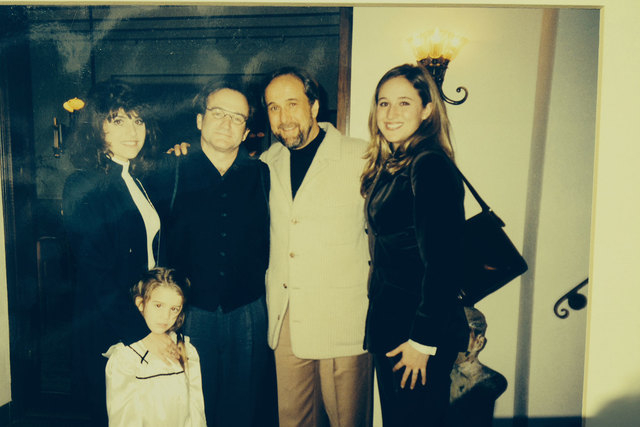Dementia from Lewy body disease makes for tricky diagnosis
America's aging population means a likely increase in the diagnosis of dementia and Alzheimer's disease, but one condition that is just as prevalent but not as well-known is Lewy body disease.
According to the Mayo Clinic, LBD affects roughly 1.4 million Americans. Its symptoms can closely resemble diseases such as Alzheimer's and Parkinson's, making it difficult to diagnose. LBD is an umbrella term for two related diagnoses: Parkinson's disease dementia and dementia with Lewy bodies, which are abnormal aggregates of protein that develop inside nerve cells in Parkinson's.
Early onset symptoms share the same underlying biological changes in the brain. Both diagnoses mean people will develop similar cognitive and behavioral symptoms.
Late actor Robin Williams had a diffused type of LBD, his autopsy revealed, with the Lewy bodies dispersed throughout his brain.
Dr. Dennis Dickson of the Mayo Clinic in Jacksonville, Fla., reviewed both the autopsy and coroner's report and stated on the Lewy Body Dementia Association's website, lbda.org, that "Mr. Williams was given a clinical diagnosis of (Parkinson's disease) and treated for motor symptoms. The report confirms he experienced depression, anxiety and paranoia, which may occur in either Parkinson's disease or dementia with Lewy bodies."
Las Vegas resident Gwen, who spoke with View on the condition of anonymity, used to enjoy walking the dogs, riding bikes and just having fun with her late husband, who we'll call Max. Max was diagnosed with LBD about three years ago when he was in his 70s.
His first incident of hallucination came after he fell asleep while doing paperwork. He awoke and claimed his mother was there and was yelling at him. His mother had been dead for years.
Gwen dismissed the episode and told him he was probably still half asleep and had been dreaming. But Max, who had a number of health problems, kept having hallucinations. One time, he had no idea who Gwen was, and when she told him that she was his wife, he replied that his wife was upstairs.
Sleepwalking was also part of it. Gwen would rise to start her day and find Max curled up on the couch.
After an episode, he would go back to normal, functioning without any issues when his episode had passed. He even filled out a complicated tax report expertly and did it by hand.
At first, the doctors said he had dementia, but as things progressed, they changed the diagnosis to LBD. Gwen had never heard of it.
"Once when he was in the hospital, he saw a large amount of ants on the wall," she said. "Another time, I drove somewhere with my husband beside me, and when I was about to get out of the car, he yelled, 'Don't get out of the car.' " Max warned her that there was a large, aggressive-looking turkey lurking under the steps. There was no turkey.
"Sometimes he would be paranoid, but again, the episode also would end, and he would be back to normal," Gwen said. "I wanted for someone to help me, but there was no cure. … I just hoped that he could get better and we could enjoy our lives."
Dr. Dylan Wint has focused his career on diagnosing and treating neurobehavioral disorders. He is board certified in both psychiatry and neurology and practices at the Cleveland Clinic Lou Ruvo Center for Brain Health, 888 W. Bonneville Ave.
Why is LBD so hard to diagnose?
"I think the main barrier to diagnosis is lack of suspicion and our impression based on data from years ago that suggested it's not that common," he said. "I had a patient come in just within the last two weeks who told me that she was told by a neurologist that she couldn't have Lewy body disease because 'It is as rare as hen's teeth.' Clearly it's not rare. It's the second-most common cause of dementia or third if you include stroke disease. It's a lot more common than we were taught to believe."
Wint said it's important that people be aware of the indicators because they may not come up in a routine evaluation. LBD is defined by having two of three core features: progressive cognitive loss; significant fluctuations in attention level or cognition, such as being unable to accomplish a common task for a couple of hours, then being able to accomplish the task; long staring spells or spells where the person is not as responsive; detailed, well-formed, visual hallucinations that occur at a higher rate than in other dementias; and physical changes such as slowness of movement, stiffness of muscles or tremors.
"If they aren't asked specifically about these things, they may not think to bring it up (with their doctor)," Wint said.
He said the number of people in Southern Nevada with LBD is about one-third to one-half those with Alzheimer's. Both are an accumulation of abnormal protein in the brain. Also, like Alzheimer's, LBD is chronic and progressive.
"It's something that people can certainly die from," Wint said.
And just as Alzheimer's has no treatment, medicines to treat LBD are repurposed from other diseases, such as antidepressants, to treat directive symptoms.
Wint said anyone diagnosed with LBD needs to pay close attention to their physical health, that they tend to have severe reactions when they get ill, and to watch for reactions to medications, in particular to anti-psychotic medications that treat agitation.
"Those can put someone with Lewy body disease in the hospital," Wint said.
Gwen said it was scary to go through LBD, and anyone facing it with a loved one should seek out a support group.
— Contact Summerlin/Summerlin South View reporter Jan Hogan at jhogan@viewnews.com or 702-387-2949.
Find support
For local support groups, visit the Lewy Body Dementia Association at lbda.org and click on "Find Support."

















